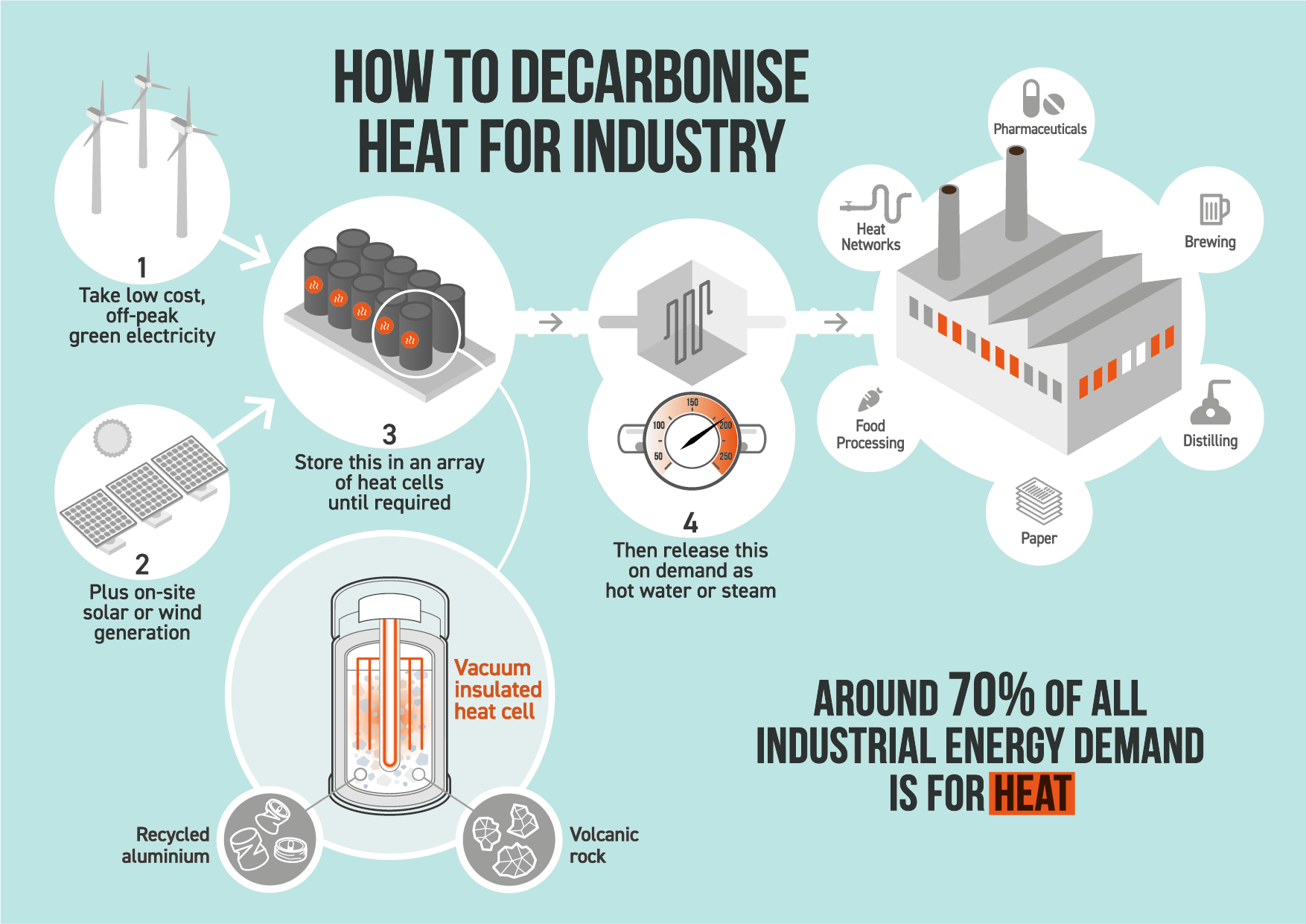Non-domestic heat flexibility
Industrial heat accounts for around 20% of UK emissions, with further emissions from space heating and hot water. Most UK businesses are using fossil fuels for these processes. These businesses need support from energy retailers and networks to work on the business case for switching to low carbon alternatives and to invest in upgrading their heating systems, building energy efficiency, machinery and processes.
More than 13 years after the conclusion of Ofgem’s energy supply “probe”, the UK non-domestic energy market remains underdeveloped, particularly for heat and building decarbonisation. This is why Thermal Storage UK welcomes Ofgem’s latest policy consultation on the non-domestic energy sector and why we recently provided our input. We can see the need for reforms to pricing transparency, incentivising flexibility, energy efficiency advice and supporting the transition. This blog sets out what those reforms could look like.
Illustration of industrial heat decarbonisation from Caldera
Pricing transparency
We support increasing energy pricing transparency for businesses, relating both to non-domestic energy suppliers and energy brokers. We worry that broker commission can have a distortive impact on incentives for businesses to decarbonise heating systems and buildings. Businesses who rely on brokers for advice about energy may receive insufficient guidance about energy efficiency and flexibility options. This is problematic because non-domestic energy suppliers do not have a strong incentive to encourage businesses to use energy more efficiently or flexibly.
Incentivising flexibility
We recommend that Ofgem takes steps to encourage or mandate non-domestic suppliers to offer flexible tariffs to businesses, large and small. The design of energy tariffs has an impact on the heat and building decarbonisation choices made by businesses. We are slowly seeing the emergence of innovative electricity tariffs in the domestic sector, including dynamic time of use tariffs and even type of use tariffs for heating products. These tariffs are rarely available to businesses, particularly the smaller microbusinesses that Ofgem’s regulatory framework focuses on. This means that businesses are less likely to benefit from the flexibility that low carbon electric heating, transport and industrial processes can provide.
Energy efficiency advice and support
We recommend that Ofgem takes a more active role in decarbonising heating and buildings, including for businesses. This would involve Ofgem working with the UK government on advice and financial support for businesses to decarbonise. While the recent launch of the UK Business Climate Hub is a positive step, more tailored, on-the-ground advice is required. This could include advice from an organisation such as the Energy Saving Trust, as well as tax incentives for investment or grants for specific improvement work.
Supporting the transition
We note that energy consumption in the non-domestic sector is already changing. We recommend that Ofgem increases its oversight of the shifts in energy use and what this means for their regulatory framework. After recent price volatility caused by the war in Ukraine, businesses are looking to switch away from using fossil fuels in their processes and are more likely to install assets such as solar panels than in the past. The UK government is supporting this transition through its Industrial Fuel Switching Competition and its Longer Duration Energy Storage Demonstration competition. Indeed, the UK government has opened a call for evidence on industrial electrification.
We encourage Ofgem to work with the UK government to reduce the relative cost of electricity to fossil fuels, including through the Review of Electricity Market Arrangements (REMA). Today it is not possible for British businesses to buy off-peak electricity at a price close to gas. Modelling an industrial customer with a demand of 4GWh (1,000 kVA electrical connection or 30,000 kWh/day gas connection) gives a Day Rate of 34p/kWh and a Night Rate of 24p/kWh. This compares with 6.7p/kWh for gas. This discrepancy is because a number of volume-based charges (per kWh) are applied to the electricity bill which are not present in the same way for gas. This includes large-scale renewable support schemes (RO, FiT and CfD) which amount to around 6.4p/kWh. Other significant electricity costs are balancing at 2p/kWh, losses at 1.3p/kWh, transmission costs at 1.0p/kWh and distribution costs at 0.55p/kWh.

